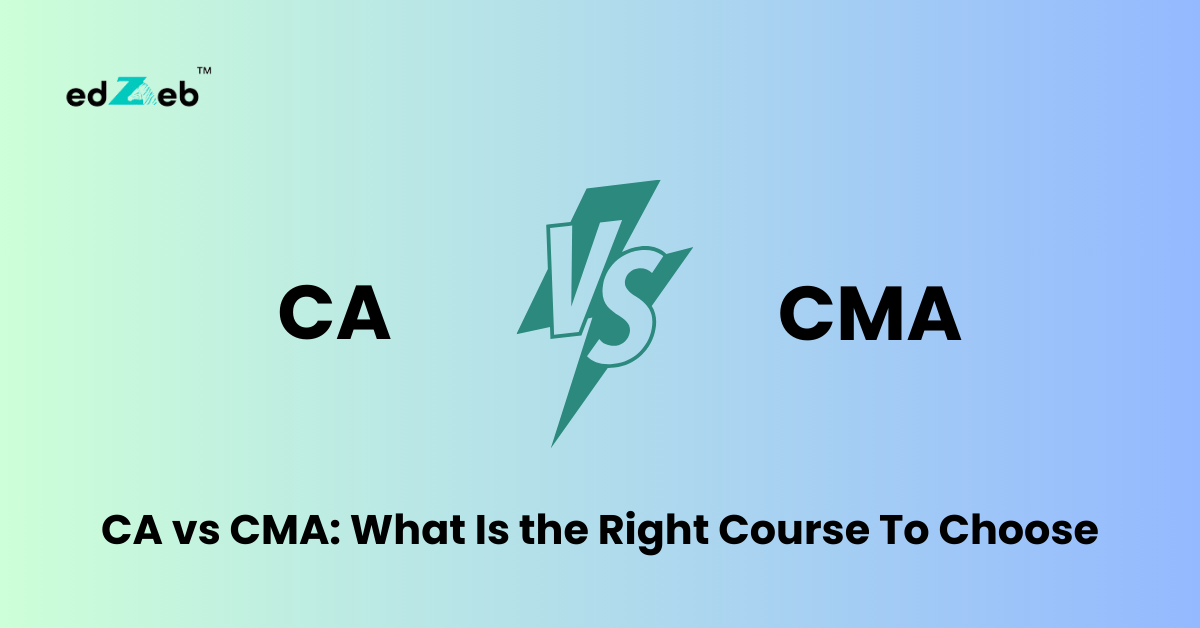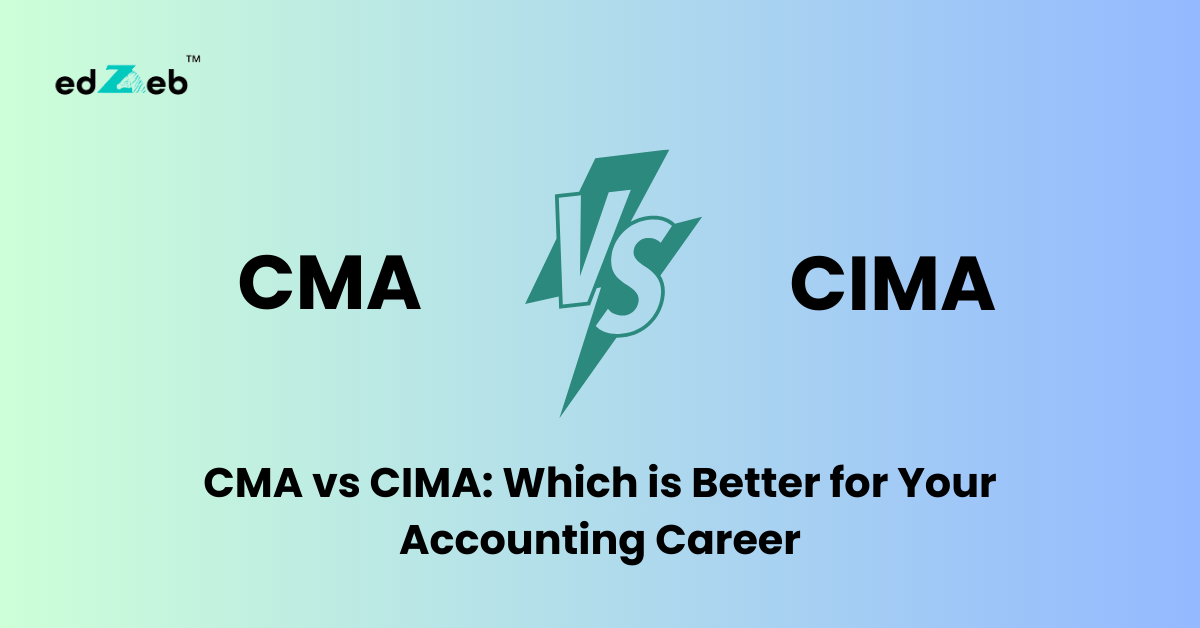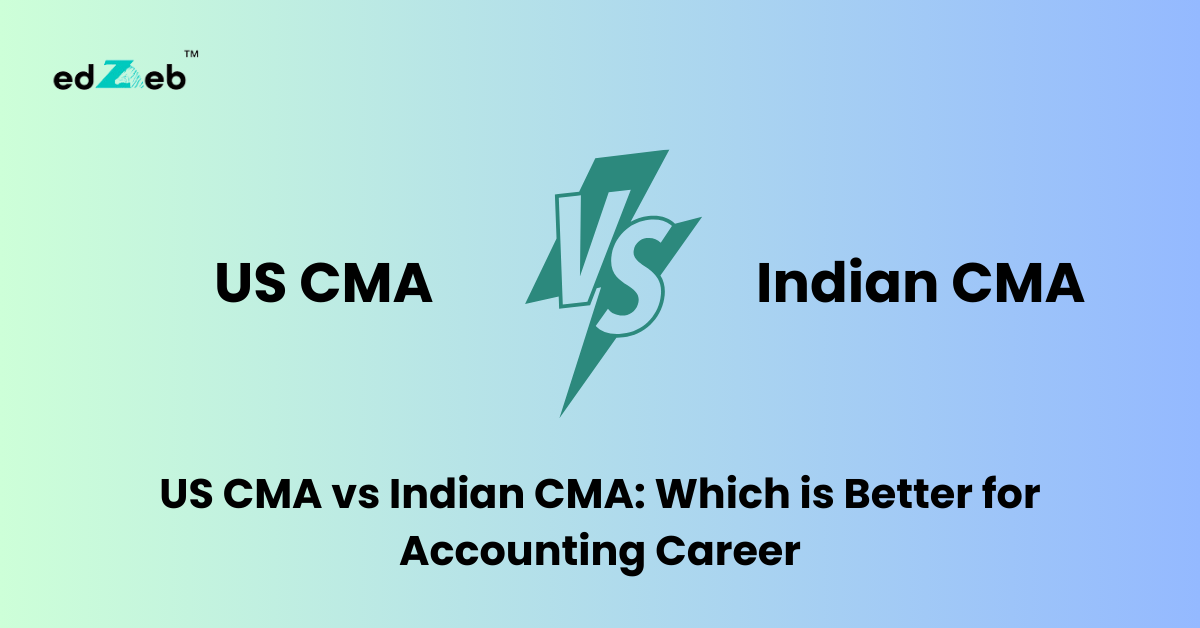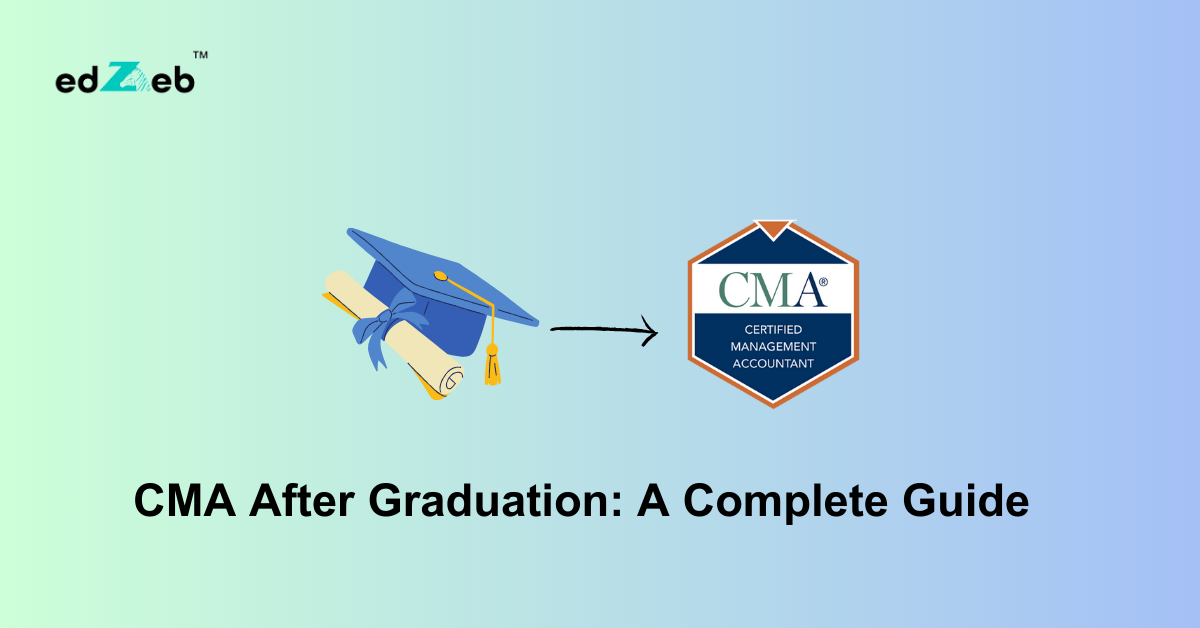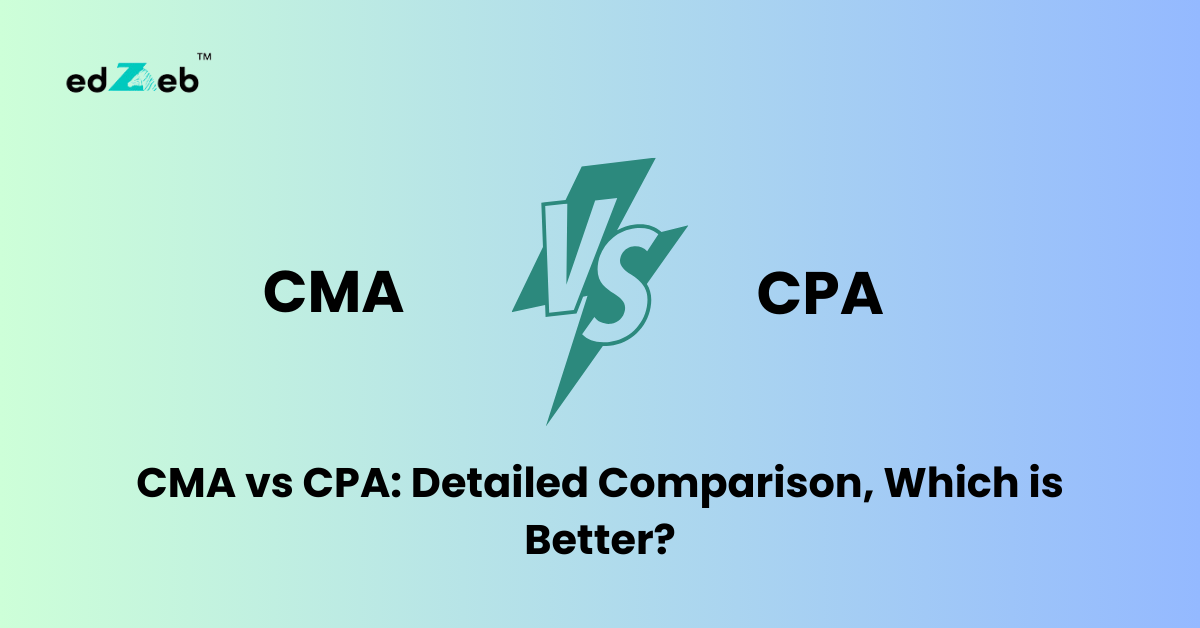
This guide explores the difference between CPA and CMA by focusing on the CPA vs US CMA duration, eligibility criteria, career prospects, and differences in exam structure, program costs, and global recognition. CMA vs CPA will help individuals make an informed decision about which career path they can choose.
Individuals will be able to align best with their career goals and aspirations. Whether you are a recent pass-out graduate student or an expert, you need to understand these paths and CPA and CMA difference to discover one’s true potential in the accounting world.
Table of Contents:
CPA vs CMA: An Overview
Knowing the key difference between CPA and CMA qualifications is essential for selecting the appropriate career path in accounting.
What is CMA?
CMA stands for Certified Management Accountant. It is a highly coveted Financial designation offered by The Institute of Management Accountants (IMA). The designation equips individuals with a unique financial accounting and strategic management skill set. The CMA exam registration process is administered by the IMA Institute.
CMA course turn individuals into professionals in analyzing and deciphering data to initiate financial improvement in businesses. This financial analysis helps in framing the business strategy behind crucial decisions and that is why they are hired as a Cost Accountant, Corporate Controller, Risk Manager, Staff and Sr. accountant, Chief Financial Officers, Accounting Managers, and VPs of Finance.
For those considering their career path after graduation, CMA After Graduation is an excellent option to gain specialized expertise in management accounting and finance.
What is CPA?
Certified Public Accountants (CPAs) are professionals who practice public accounting duties. These duties include tax, accounting, and financial planning. They are trusted advisors to businesses and individuals who are responsible for ensuring financial accuracy and compliance.
CPA professionals also examine financial statements for any mismatch and keep themselves updated on tax laws to guide complex financial decisions and optimize tax strategies. Their dedication to upholding ethical standards sets them apart as pillars of trust in the financial world.
The CPA distinction is highly desired by accounting professionals who want to develop their careers globally.
Difference Between CPA and CMA
Acknowledging the CPA and CMA difference, both certifications will help you choose the right door opening toward various rewarding careers. No doubt they serve distinct roles within the field and cater to different skill sets. It is known that the CPA focuses more on public accounting and auditing, while the CMA emphasizes management accounting and strategic financial management.
The table below represents the key differences, so refer to it and get a brief of CPA vs CMA.
CMA vs CPA | ||
Criteria | CMA | CPA |
Eligibility | Bachelor’s degree required (10th for foundation course) | No mandatory degree, but credit requirements vary by state |
Course Duration | 3 years or more | 1-2 years (varies based on factors) |
Exam Structure | MCQ and essay-type questions | MCQs, task-based simulations, or written communication tasks |
License Requirements | Less stringent work experience and coursework requirements | More stringent requirements for work experience and coursework |
Exam Difficulty | Rigorous, known for its difficulty | Requires critical thinking and attention to detail |
Pass Rate | Industry average around 45% | Similar as CMA |
Salary | Average ₹6 lakhs per year | Average ₹8 lakhs per year |
Career Opportunities | Financial Analyst, Management Accountant, Senior Accountant, Cost Accountant, Financial Risk Manager, Corporate Controller, CFO | Compliance auditor, Corporate accountant, Tax accountant, Cost accountant, Financial Advisor, Cost estimator, Accounting professor, Forensic accountant |
Eligibility Criteria
There are certain prerequisites to meet if you want to earn any of the qualifications whether it’s CMA or CPA.
Want to become a CMA professional? For that, you should possess a bachelor’s degree. You are only eligible to apply for the CMA foundation course after passing the 10th but must qualify 12th to appear for the exams.
And in case you want to be a CPA-certified professional, a mandatory degree is not required. It also follows a credit system so it can also be done by those having 120 or 150 credits. These credit points vary depending on the state you want to apply for from an NAAC-recognized university.
Course Duration
Comparing the Certified Management Accountant vs Certified Public Accountant course duration will give an idea of how much time you have to take out to devote to earn the credential.
CPA course takes less time to complete as compared to CMA. The US CMA course duration requires candidates to complete it within 3 years and the CPA duration is about 1 to 2 years but it varies depending on different factors like prior education, experience, region-specific requirements, and ethics requirements.
CMA or CPA Exam Structure
The certifications are different, and so is the exam structure of each.
The CMA exam structure is divided into two parts in the CMA exam syllabus.
| Financial Planning, Performance & Analysis | Strategic Financial Management |
| External Financial Reporting Decisions (15%) | Financial Statements Analysis |
| Planning, Budgeting and Forecasting (20%) | Corporate Finance |
| Performance Management (20%) | Decision Analysis |
| Cost Management (15%) | Risk Management |
| Internal Control (15%) | Investment Decisions |
| Technology and Analysis (15%) | Professional Ethics |
Each part of the CFA exam is 3 hours long. The first section contains 100 multiple-choice questions, representing 75% of the exam score. The second section is essay writing representing the remaining 25% and you are given 30 minutes to write each of the two essays.
However, the CPA Exam consists of three four-hour core sections and one four-hour Discipline section.
Core | Discipline |
| Auditing and Attestation (AUD) | Business Analysis and Reporting (BAR) |
| Financial Accounting and Reporting (FAR) | Information Systems and Control (ISC) |
| Taxation and Regulation (REG) | Tax Compliance and Planning (TCP) |
You have the option to pick and choose one out of these three four-hour discipline sections of your choice. Each test consists of multiple-choice questions, task-based simulations, or written communication tasks.
License Requirements
CPA candidates need to fulfill more requirements when it comes to work experience and specific coursework eligibility, unlike CMAs. It is more flexible which allows candidates to meet the requirements through various pathways and provides a more accessible route to gain the CMA certification.
CMA vs CPA Exam Difficulty
Exams do check your level of intelligence and students qualifying exams ensure industry needed skills. So, the CMA vs CPA exam is meant to check your intellectual ability.
If we go by the industry average CMA pass rate is 45%, meaning less than half of the people taking the test will pass. The CMA exam is known for its rigor and difficulty, so to clear it, you need to prepare thoroughly. If we talk about the CPA exam difficulty, it is also a rigorous exam that checks your ability to think critically and pay attention to detail.
Thus, the Certified Management Accountant vs Certified Public Accountant exam is not something easy like eating a piece of cake, it needs complete devotion, dedication, determination, and hard work to earn a credential like these.
Passing Rate
Considering the industry average CMA pass rate is 45% which means that those making an effort will definitely pass, be it less than half of the people taking the test. It is likely to be the same for CPA pass rates as well.
CMA vs CPA Salary
The CMA vs CPA salary is one of the major deciding factors to decide which one to choose between Certified Management Accountant vs CPA. The candidates with specialized credentials no doubt stand out and earn better than their peers with no such qualifications.
Considering the CMA vs CPA salary package, the CMA salary on average is around ₹6 lakhs per year, or ₹50,000 per month, whereas the CPA salary is ₹8 lakhs per year, or ₹66,666 per month on average.
Career Opportunities
CMA career opportunities after CMA certification are as follows:
- Financial Analyst.
- Management Accountant.
- Senior Accountant.
- Cost Accountant.
- Financial Risk Manager.
- Corporate Controller.
- Chief Financial Officer (CFO)
While the common job roles available to CPA professionals are:
- Compliance auditor
- Corporate accountant
- Tax accountant
- Cost accountant
- Financial Advisor
- Cost estimator
- Accounting professor
- Forensic accountant
CPA or CMA which is better?
Both certifications offer unique advantages. It does not matter whether CPA or CMA which is better, but what matters the most is that CPA or CMA which is better for your career goals and your interests.
The CPA certification is more inclined towards equipping individuals with public accounting knowledge and skills. It includes auditing and tax services along with covering a broad range of topics such as audit and attestation, regulation, financial accounting, and business environment concepts. With its worldwide recognition, CPA professionals are required for certain positions in public accounting firms or those that require a CPA license to practice.
Moving on to the CMA certification. It specializes in management accounting which includes topics like financial planning and analysis, budgeting, and strategic planning. The CMA certification focuses more on the practical aspects of accounting and management like financial planning, performance and control, and decision analysis. In the accounting industry, the CMA certification is still highly regarded despite not being as well-known as the CPA qualification.
Therefore, any qualification out of CPA or CMA which is better depends on the bottom line that suits your interests and aspirations. Your passion for Certified Management Accountant vs Certified Public Accountant, any of them will keep you interested in your work for a lifetime leading to better efficiency and more productivity.
Conclusion
The choice between Certified Management Accountant vs CPA certifications is challenging due to their unique skills, career paths, and challenges. Choosing the right certification can lead to a fulfilling career in finance. So, it is better to analyze which certification out of CMA vs CPA aligns best with your goals and aspirations. We, at edZeb offer a CMA coaching program, aligned with the exam syllabus, under experienced faculty guidance and interactive sessions. The practice assessments, flexible learning options, comprehensive study material, and mock exams ensure effective preparation for CMA certification.
FAQ’s
Is CPA better than CMA?
A credential is only better for you if it aligns with your career goals and aspirations. So, it does not matter which one is better out of the two.
Is CMA worth it?
It is worth doing a professional certification like CMA especially if you are looking to build a career globally in the finance and accounting sector. It is an application-based course offered by edZeb equipping candidates with much-needed industry skills and knowledge to excel in their careers.
Is CMA recognized in the USA?
Yes, it is a globally recognized designation that is valued in the USA as well. CMA professionals earn around $60,000 per year, with the potential to reach $100,000 to $125,000 with experience.
How much does CMA US earn in India?
There is a wide scope of CMA US in India and the professionals can start earning between INR 5–7 lakhs per year which can go up to INR 25 lakhs per year as you gain experience and get promoted to executive level.


